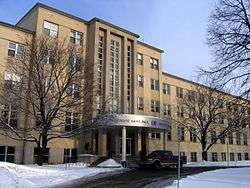Saint Paul University
 Guigues Hall, Saint Paul University | |
| Type |
Public Pontifical university |
|---|---|
| Established | 1848 |
| Affiliation | Roman Catholic (Missionary Oblates of Mary Immaculate) |
| Chancellor | Reverend Terrence Prendergast, S.J., Archbishop of Ottawa |
| Rector | Chantal Beauvais |
| Students | 733 |
| Undergraduates | 170 full-time + 260 part-time |
| Postgraduates | 260 full-time + 90 part-time |
| Address |
223 Main Street, Ottawa, Ontario, Canada 45°24′29″N 75°40′34″W / 45.4081°N 75.676°WCoordinates: 45°24′29″N 75°40′34″W / 45.4081°N 75.676°W |
| Campus | Urban |
| Affiliated university | University of Ottawa |
| Affiliations |
AUCC IAU AUFC ACU CBIE NDEA (International affiliate) |
| Website | www.ustpaul.ca |
Saint Paul University (French: Université Saint-Paul) is a Catholic Pontifical university federated with the University of Ottawa. It is located on Main Street in Ottawa, Ontario, Canada, and is entrusted to the Congregation of the Missionary Oblates of Mary Immaculate. The enabling legislation is a civil charter passed by the government of the then-Province of Canada in August 1866, and a pontifical declaration promulgated by Pope Leo XIII on 5 February 1889.[1] Like the University of Ottawa, Saint Paul University is a fully bilingual institution, offering instruction in English and French.
History
In 1848, Joseph-Bruno Guigues, the first bishop of the Roman Catholic Archdiocese of Ottawa, established the College of Bytown. In 1856, the College was officially entrusted to the Missionary Oblates of Mary Immaculate, and, in 1866, it was renamed the College of Ottawa. The institution would later rewrite its pontifical charter in keeping with the Apostolic Constitution of Pope Pius XI, and also rewrote its civil charter around the same time. Its rewritten civil charter was approved by the Government of Ontario in 1933, when it was officially renamed the University of Ottawa, and its revised pontifical charter was approved by the Holy See in 1934. On July 1, 1965, by an act of the Ontario Legislature, the institution previously known as the University of Ottawa was renamed Saint Paul University, which retained its civil and pontifical charters, while a new corporate body, to be known as the University of Ottawa, was created to inherit the university's civil faculties.
Although the government wished to preserve the university's Christian character, it was felt that a separate institution would better fulfill the needs of the city's Catholic community. The two universities became federated, and while Saint Paul University retains the authority to grant its own degrees, it reserves the right to jointly award degrees with the Senate of the University of Ottawa.
Programs
The university currently houses four faculties: Human Sciences, Philosophy, Theology and Canon Law. Within these faculties are housed programs in 19 disciplines, ranging from the undergraduate to the doctoral level. Such disciplines include: Anglican studies, biblical studies, canon law, canonical practice, conflict studies, counseling and spirituality, Eastern Christian studies, ecclesiastical administration, ethics, group facilitation, ministry, pastoral theology, philosophical theology, philosophy, public ethics, religious education, social communications, spirituality, and theology.
Mission

Saint Paul University offers education for both the laity and candidates for ordination in the Roman Catholic, Anglican, and Eastern Catholic Churches. The Bachelor of Theology and Master of Pastoral Theology (similar to the Master of Divinity) are the standard ordination-track degrees.
Partnership
The university is a member of the Association of Colleges and Universities of the Canadian Francophonie, a network of academic institutions of the Canadian Francophonie.[2]
It was announced from autumn 2017, that St. Paul's, will begin offering, a joint distance learning, Licentiate in Canon Law (JCL) and joint civil masters in canon law with St. Patrick's College, Maynooth, Ireland.
Alumni
- Cardinal Francis Eugene George, OMI
- Sister Helen Prejean M.A. (1973)
See also
References
- ↑ http://www.ustpaul.ca/print.php?page=493 About SPU - History
- ↑ AUFC
Bibliography
- Schlitt, Dale M.; Saint Paul University. (2008). Université Saint-Paul : hier, aujourd'hui et demain = Saint Paul University : yesterday, today and tomorrow. Ottawa: Université Saint-Paul = Saint Paul University. ISBN 978-0-919261-60-0.
External links
| Wikimedia Commons has media related to Saint Paul University. |
- Saint Paul University
- Future Students Portal
- Housing and Residence
- Association of Universities and Colleges of Canada profile
